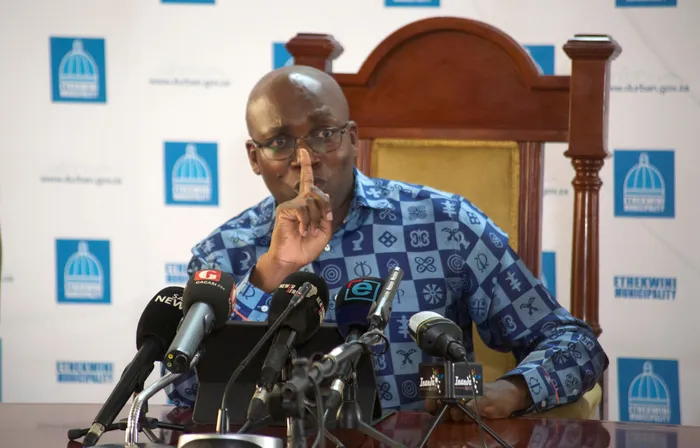Restoring public trust a tough task for new executive mayor

Former eThekwini Mayor Mxolisi Kaunda’s last press briefing at the Durban City Hall. The incoming executive mayor needs to be an individual who transcends political loyalties and acts in the best interests of eThekwini citizens, the writer says. – Picture: Khaya Ngwenya./ Independent Newspapers
By Paul Kariuki
Municipalities are the spheres of governance closest to the citizenry. This proximity primarily provides them with equitable and sustainable access to basic services, as mandated by the Constitution of the Republic of South Africa.
However, while there have been significant efforts from the government to ensure that this constitutional ideal is realised, most municipalities across the country are still battling to satisfactorily provide basic services such as water, sanitation, refuse collection, housing and access to health, among others, to their constituencies.
Moreover, apart from the challenges to do with the provision of basic services, further challenges such as poor accountability, poor governance, internal institutional instability, weak oversight and weak consequence mechanisms, among others, continue to beset most municipalities and weaken their capacity to deliver optimally on their constitutional mandate. These challenges are well- documented by the auditor-general’s 2022 and 2023 audit reports.
eThekwini Metropolitan Municipality is no exception to these challenges. It has experienced a fair chunk of them over the years and its glamour has waned. With the redeployment of the former executive mayor to the National Council of Provinces (NCOP), the city’s political leadership (all political parties) has an opportunity to rethink the mayoral leadership needed to restore the city’s lost glamour.
Last year, the national Department of Co-operative Governance and Traditional Affairs (Cogta) placed the eThekwini Municipality under Section 154 administration due to its governance challenges. Citizens are yearning for a city that works for them, serves them equitably, meets their expectations and, more importantly, is governed professionally and promotes good governance and accountability as a norm.
Given the recent electoral outcome, voters spoke loudly through their votes. It cannot be business as usual. Non-performance will be punished and might mean a total loss of political support from voters. Therefore, irrespective of the political parties that will appoint an executive mayor for the city, voters want results and expect nothing less. It is a tall order for the incoming mayor to meet such expectations.
So the question is: Can the city be restored?
Certainly, it can be. However, a multi-stakeholder approach will be needed to ensure accountability and commitment from the various stakeholders, such as the municipal leadership, political parties, council members and organised civil society.
First and foremost, the task of the above team is to restore public trust. This is not an easy task given the scope of the leadership deficit that has been experienced at the metro. As daunting as it can be, it is still needed and must be fast-tracked. Restoring public trust will require instilling a culture of performance, transparency, accountability and integrity.
Secondly, there has to be a change in the leadership model at the metro to support good governance. The leadership model must be citizen-centric. This approach to leadership allows citizen participation in the design and formulation of strategies, including decision-making processes.
There is an urgent need to have citizens’ needs and aspirations at the centre of metro leadership. It has been the missing link. The more that citizens influence the various decision-making processes, the better for enhancing accountability and good governance at the metro.
In the present reality of collective governing, all political parties must lay aside their party visions and rethink, allowing eThekwini citizens and their aspirations to influence the decision on who will take up the mayoral position.
The incoming executive mayor needs to be an individual who transcends political loyalties and acts in the best interests of eThekwini citizens. More importantly, the position will require strong ethical leadership to influence change, restoring the city to winning ways.
Connected to the above point, consequence management must be strengthened as a norm.
The increasing incidences of poor performance, weak institutional accountability mechanisms, maladministration and corruption have weakened the ability of the city to attract investors and risk losing the few investors still operating their businesses in the city. From an economic perspective, the incoming mayoral leadership must prioritise confidence restoration to the business community, both domestic and international.
There are many city dwellers, irrespective of their political affiliations, who are concerned about the state of affairs in the city. Despite their disappointment and disillusionment, they are willing to work towards restoring the city to its glory days.
They are yearning for a transparent metro leadership that is accountable to them, committed to improving its performance and managing public finances optimally to deliver basic services efficiently. Moreover, they are yearning to see their elected political representatives and municipal officials lay aside their political interests and demonstrate integrity in all their dealings with one another.
In conclusion, eThekwini has immense potential to be an attractive investment destination for domestic and international investors. However, the challenges mentioned in the preceding sections must be addressed with the urgency they deserve by the incoming mayor.
Furthermore, collective leadership is needed. All political parties must come to an agreement that citizens’ needs must be prioritised and put at the centre of all policies and governance processes.
No one must be left behind in this daunting task of restoring the city’s lost glamour. There has to be an urgency to clean up the metro leadership, to stabilise it and focus it on the concerns of city dwellers, who want prompt, efficient and citizen-centred service delivery. This is their cry.
Will the incoming metro mayor hear and respect it? Only time will tell.
Dr Paul Kariuki is executive director of the Democracy Development Programme (DDP). He writes in his personal capacity.
Related Topics: